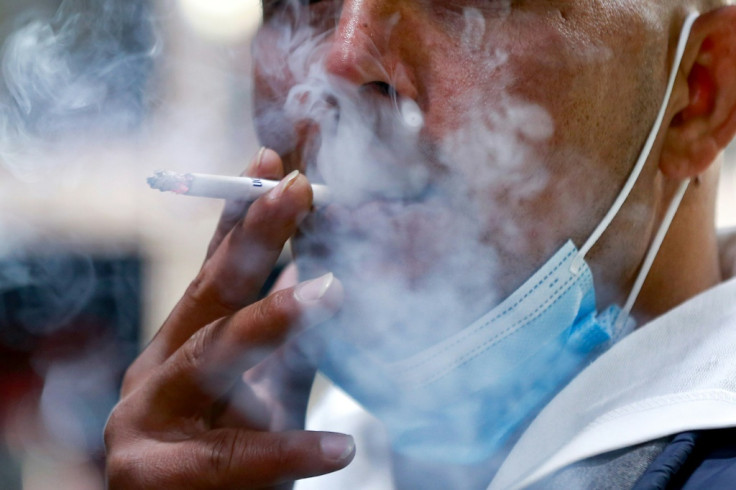'Uncle Chen' Goes Viral Again For Chain-Smoking While Running Marathon
A 52-year-old man, who went viral for his smoking habits two years ago, gained more attention after he was disqualified from the 2024 Xiamen Marathon.

A Chinese man, known as "Uncle Chen" and "Smoking Brother" in China, was disqualified from the 2024 Xiamen Marathon after he was caught blending his smoking and running habits.
"Uncle Chen" completed the marathon, which went on for 26.2 miles, in just three hours and 33 minutes.
While the marathoner's speed was impressive and above average, his most recent finishing time was five minutes longer than his run in 2022.
After finishing the race, "Uncle Chen" was slammed and disqualified for violating the race rules after he proceeded to chain-smoke cigarettes on the course.
Last year, the Chinese Athletics Association implemented new rules that banned smoking to encourage healthier lifestyles amongst participants in the race. The anti-smoking proposal also set out to reduce smoking during all road-running events and warned participants that they could face disqualification.
In response to "Uncle Chen's" disqualification, the Xiamen Marathon posted a statement on Chinese social media app Weibo, clarifying that the organisation has banned "uncivilised behaviour from runners such as open defecation, smoking, or trampling on flower beds or green spaces that affect the race and the safety of other runners will result in disqualification".
According to the Chinese news page Sohu the 52-year-old, who went viral two years ago after images of his unhealthy habit circled on social media, smoking cigarettes during past marathons has helped to relieve fatigue.
Other images of "Uncle Chen", which showed the marathoner holding a smoking cigarette in his mouth while keeping ahead of other runners, first surfaced at the 2018 Guangzhou Marathon and the 2019 Xiamen Marathon.
Chinese marathon runner disqualified for chain-smoking through entire race
— Owen Gregorian (@OwenGregorian) January 20, 2024
Being in good enough shape to complete a full 26.2-mile marathon at 52 years old is impressive.
To do so while chain-smoking the entire race is downright insane.
That’s what a man named Uncle Chen did… pic.twitter.com/JIRSRfMSIJ
According to the World Health Organisation (WHO), China is the largest producer and consumer of tobacco in the world, with Chinese men consuming roughly 40 per cent of the world's cigarettes.
Although around 50 per cent of men are smokers in China, just 2 per cent of women in China, are smokers.
The presence of mass cigarette addiction in China is leading to a growing burden of tobacco-attributed deaths and diseases that only put pressure on healthcare systems.
Data also shows that almost one-third of the world's total number of smokers is in China, currently measuring at more than 300 million.
In Hong Kong, current laws ban smoking inside restaurants, at work, in indoor public spaces and certain outdoor spaces.
In a bid to reduce the number of smokers in Hong Kong, the Secretary for Health of Hong Kong, Professor Lo Chung-Mau, asked the public to stare at those who are smoking in the banned areas to encourage them to stop.
"When the members of the public see people smoking in non-smoking areas, even if no law enforcement officers can show up immediately, we can stare at the smokers," Professor Lo Chung-Mau, who is also a medical doctor, said.
Considering police will struggle to catch the smokers who break the new laws, the Secretary for Health continued to recognise how smoking was bad for everyone's health and that Hong Kong needed to have a "culture in society that people are willing to comply with the law".
To rid the nation of the habit, Hong Kong's government have pledged to significantly increase the tax on a pack of cigarettes and ban those born after a certain year from ever purchasing tobacco products.
At the end of last year, Prime Minister Rishi Sunak also announced plans to phase out the sales of tobacco products. The new smoking limits would see the legal age that a person can buy cigarettes, currently 18, increase each year.
Sunak went on to call the smoking ban proposal one of the "biggest public health intervention in a generation".
© Copyright IBTimes 2025. All rights reserved.






















